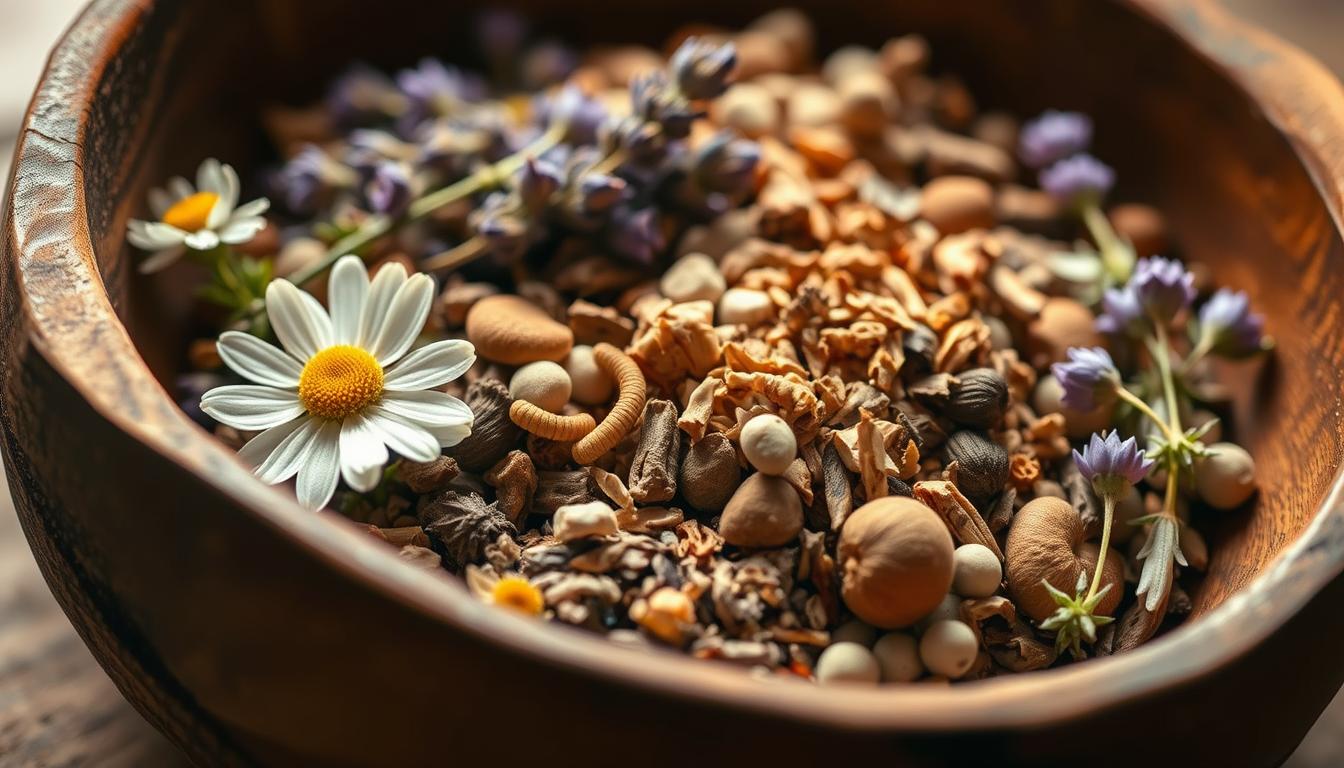Natural stress relief Try herbal remedies like chamomile and ashwagandha to ease stress naturally
Stress felt like a heavy weight, pressing down, even after deep breaths. I tried apps and meditation but nothing worked. Then, I turned to nature.
Chamomile tea became my evening ritual. Its warm, floral taste wrapped around me like a blanket. Later, I found ashwagandha, an ancient herb that grounded me without making me sleepy.
Now, I share what I learned. Natural stress relief is simple. It starts with plants that have been here for centuries. They are backed by science and easy to add to any routine.
Table of Contents
Introduction to Natural Stress Relief

Natural stress relief helps calm the mind and body with plant-based solutions and mindful practices. It avoids synthetic drugs, using science-backed methods for balance. Simple tools like herbal teas or breathing exercises can greatly improve daily well-being. If you’re looking for a natural remedy to help manage stress,
Ashwagandha is a powerful herb worth considering. Known for its adaptogenic properties, ashwagandha helps your body adapt to stress and promotes a sense of calm. It can improve mental clarity and boost energy levels, making it an ideal choice for those dealing with the daily stresses of life. For a convenient and effective way to incorporate ashwagandha into your wellness routine, you can check out this high-quality product here on Amazon.
What is Natural Stress Relief?
It’s a holistic strategy that uses herbs, meditation, and healthy habits to ease tension. Here’s how it works:
- Herbs like chamomile contain compounds that soothe nerves.
- Mindfulness practices quiet the overactive mind.
- Regular exercise boosts endorphins, reducing anxiety.
My Journey with Herbal Remedies
My first step was sipping chamomile tea every night. It helped me relax after work. Then, I discovered ashwagandha, a herb that lowers cortisol levels, according to studies.
Over time, these became part of my daily routine. I now combine them with short walks and deep breathing. These small changes have made stress management a sustainable part of my life.
Understanding Stress and Its Effects
Stress is how our bodies react to challenges. But, if it stays for too long, it can hurt our minds and bodies. Research shows it can increase the risk of heart disease, anxiety, and sleep problems. I learned that ignoring stress can make us weaker over time.

When we face stress, our hearts race and muscles tighten. This can lead to burnout. That’s why I look for reduce stress naturally ways. Herbal teas like chamomile or ashwagandha supplements calm our nerves without harmful chemicals.
Acting early is key. Simple steps like deep breathing or walking outside can help balance our bodies. Knowing when we’re stressed early on can prevent bigger health issues later.
The Power of Herbal Remedies for Stress
Nature’s remedies offer stress relief strategies without harsh side effects. Chamomile and ashwagandha, backed by science and tradition, show plants can tackle stress at its roots.

Benefits of Chamomile
Chamomile tea is more than soothing—it’s science-backed. Studies show its apigenin compound calms the nervous system. I use it nightly to unwind, and research from the Journal of Advanced Nursing confirms it improves sleep quality.
Try it as a warm drink before bed or in calming herbal blends like Traditional Medicinals’ chamomile tea.
Benefits of Ashwagandha
Ashwagandha, an adaptogen, lowers cortisol, the stress hormone. A 2012 Journal of Indian Medicine study found it reduces anxiety by 30% in 6 weeks. I take it in capsule form (like Gaia Herbs’ organic ashwagandha) with meals to stay focused during busy days.
How Herbs Complement Modern Lifestyles
- Portable: Herbal supplements fit into busy schedules
- Affordable: Tea bags cost under $5 for a month’s supply
- Non-addictive: Safe for long-term use compared to prescription drugs
These herbs aren’t a quick fix—they’re tools to build resilience. Pair them with breathing exercises or short walks for a layered approach. My morning routine blends ashwagandha capsules with a 10-minute meditation, making stress manageable without overhauling life.
How I Use Chamomile for Relaxation
I found out chamomile is more than just a bedtime tea. It’s a simple yet powerful tool for daily stress reduction methods. For years, I’ve used its calming effects to relax. Here’s how I incorporate it into my routine:
- Evening Tea Ritual: A cup of organic chamomile tea (two bags steeped for 5 minutes) quiets my mind before bed. I add a dash of honey for taste.
- Essential Oil Diffusion: Mixing a few drops of chamomile oil in a diffuser during work breaks eases tension without leaving my desk.
- Herbal Bath Soaks: Adding dried chamomile flowers to warm baths creates a sensory escape after stressful days.
| Method | Best Time | Benefits |
|---|---|---|
| Tea | Evenings | Calms nerves, improves sleep quality |
| Oil Diffusion | Workdays | Quick mental reset |
| Bath Soaks | Weekends | Full-body relaxation |
Research shows chamomile’s apigenin compounds interact with brain receptors to reduce anxiety. I use 1–2 methods daily, adjusting based on my schedule. Pairing these practices with mindfulness or light exercise boosts their effect. It’s not just about the herb—it’s about building routines that fit into real life.
Exploring Ashwagandha for Anxiety Management
Adding ashwagandha to my holistic stress relief routine made a big difference. This adaptogen, known in Ayurvedic traditions, is now a key part of my daily routine. Studies show it can lower cortisol, the stress hormone linked to anxiety.
Personal Experiences with Ashwagandha
After taking 300 mg of standardized extract daily for two months, my anxiety symptoms eased noticeably. Unlike quick fixes, ashwagandha works gradually, aligning with my preference for natural solutions. Combining it with mindfulness practices deepened the benefits of my holistic stress relief approach.
Dosage and Preparation Techniques
Effective use requires consistency. Here’s how I integrate it:
- Start with 300–500 mg daily, consulting a practitioner first.
- Choose high-quality extracts standardized for withanolides.
- Pair with meals for better absorption.
| Form | Dosage | Benefits |
|---|---|---|
| Capsules | 300–500 mg/day | Convenient, standardized potency |
| Tea | 1 tsp dried root brewed 15 mins | Cost-effective, soothing ritual |
| Tinctures | 1–2 ml twice daily | Quick absorption, customizable doses |
Experimenting with these methods helped me find what works best. My journey shows ashwagandha isn’t a standalone cure but a valuable part of a balanced holistic stress relief strategy.
Mindfulness and Simple Stress Management Techniques
Practicing mindfulness for stress relief is now a daily part of my life. I mix deep breathing and meditation with herbal teas like chamomile or ashwagandha. This mix boosts their calming effects. Here’s how I do it:
- 5-Minute Breathing Breaks: I breathe in deeply through my nose, hold for four counts, then breathe out slowly. This helps me focus and relax.
- Body Scan Meditation: I lie down and mentally check my body from toes to head, letting go of stress. It’s a quick way to calm down.
- Walking Mindfully: I take 10 minutes to walk, paying attention to each step and my surroundings. It keeps me grounded on busy days.
Combining these practices with herbal remedies brings balance. For example, drinking chamomile tea while meditating makes me even more relaxed. Studies confirm mindfulness lowers cortisol, the stress hormone. This is why I keep up with this routine. It’s all about small, consistent steps and being present.
Reduce Stress Naturally with Lifestyle Changes
Small changes in our daily lives can make a big difference. Simple stress relief tips like exercise, sleep, and mindful eating can bring lasting calm. Here’s how I’ve made these changes work for me.
Daily Habits That Calm the Mind
- Move more: A 30-minute walk or yoga flow releases endorphins. I dance while cooking—it’s free and fun!
- Sleep smart: I set a bedtime alarm to ensure 7-9 hours. A dark room and no screens before bed help my mind wind down.
- Eat with intention: I prioritize veggies, nuts, and water. Cutting back on coffee after 2 PM stops my mind from racing at night.
Integrating Relaxation into Routine
Little rituals add up. I use box breathing (inhale 4 counts, hold 4, exhale 4) during breaks. Setting phone reminders labeled “Breathe” keeps me consistent. Even 5 minutes of stretching or sipping herbal tea midday resets my focus.
These stress relief tips don’t demand big changes—they’re about consistency. When I prioritize movement, sleep, and mindful choices, stress fades into the background naturally.
Personal Insights on Natural Stress Relief: My Strategies for Everyday Well-being
Exploring herbs like chamomile and mindfulness has helped me find a personal way to natural anxiety relief. Here’s what works for me:
Effective Stress Relief Tips
- Deep breathing breaks: I take 5-minute breathwork sessions whenever stressed. Focusing on slow inhales and exhales helps reset my nervous system.
- Journaling: Writing down worries before bed clears my mind. It’s a simple yet powerful tool to process emotions without medication.
- Walking routines: Daily 20-minute walks in nature lower my stress hormones. I track progress using the Apple Health app to stay consistent.
Holistic Approaches and My Secrets
I mix science-backed methods with personal rituals. My top picks include:
- Essential oil blends: Mixing lavender and bergamot in a diffuser creates a calming environment. I use Aura Cacia brand oils for purity.
- Herbal tea mixes: My go-to is Yogi Bedtime Tea with valerian root, which research shows supports relaxation.
- Bedtime routine: An hour before sleep, I dim lights and listen to rain sounds on Insight Timer. This signals my body to wind down naturally.
Consistency is key. Small daily habits like these build resilience over time. By trusting these natural anxiety relief practices, I’ve reduced reliance on prescription medications without sacrificing effectiveness.
Holistic Approaches to Stress Reduction Methods
Effective stress relief comes from a holistic approach. This includes mindfulness, herbal remedies, and lifestyle changes. By combining these, I’ve found lasting relief without quick fixes.
Integrating Mindfulness and Herbal Remedies
Mindfulness and herbal supplements work well together. I start my day with a 5-minute breathing exercise and ashwagandha tea. This combo keeps me centered. Here’s what I’ve found to be effective:
- Meditation with chamomile tea
- Yoga followed by L-Theanine (Suntheanine) supplements
Balanced Nutrition and Activity
Nutrition is crucial. My diet now includes walnuts and spinach, which lower cortisol. Walking or yoga twice a week boosts my mood naturally. Here’s a summary:
| Category | Strategy | Example |
|---|---|---|
| Mind-Body Practices | Combine herbs with mindful movement | Ashwagandha capsules before yoga |
| Nutrition | Incorporate stress-fighting foods | Dark chocolate (magnesium source) |
| Activity | Short daily exercise | 20-minute brisk walk |
Consistency is key. Making small changes, like switching to herbal tea, helps these habits stick. Over time, these small steps lead to big results.
Conclusion
Looking back, I’ve found that chamomile tea before bed calms my mind. Ashwagandha also helps quiet anxious thoughts. These natural remedies are not just trends; they’re backed by science.
Stress doesn’t have to rule your day. Simple actions like drinking herbal tea or practicing mindfulness can change your routine. These small steps can lead to a more peaceful life.
My journey shows that mixing herbs like ashwagandha with activities like breathing exercises or walks in nature is key. Don’t forget the importance of sleep, eating well, and staying active. Always talk to a doctor before trying new supplements to make sure they’re safe for you.
Natural remedies and mindful practices are gentle yet effective. Let them help you find a quieter, more balanced life. Your well-being is worth exploring every option that feels right for you.
FAQ
What exactly is natural stress relief?
Natural stress relief means using methods that don’t involve synthetic meds. It includes herbal remedies, mindfulness, and lifestyle changes. These help improve your overall well-being.
How do herbal remedies like chamomile and ashwagandha work for stress management?
Chamomile calms you down, while ashwagandha helps your body handle stress better. Both are key in reducing anxiety and helping you relax.
Can I integrate herbal remedies into a busy lifestyle?
Yes! Herbal remedies fit easily into your day. For example, drinking chamomile tea at night or taking ashwagandha in the morning can help you stay calm, even when you’re busy.
What are some mindfulness techniques for stress relief?
Mindfulness techniques include meditation, deep breathing, and being thankful. They’re easy to do anywhere, anytime. They work well with herbal remedies to manage stress.
Are there any daily habits that help with stress reduction?
Yes! Exercising regularly, getting enough sleep, and eating well are key. Adding yoga or walks can also help.
What is the best way to take ashwagandha for anxiety relief?
Take 300-600 mg of ashwagandha extract daily. You can use capsules, powders, or mix it in drinks.
How can I ensure I’m using chamomile effectively?
Drink chamomile tea before bed to relax. You can also try chamomile extracts or supplements. Always follow the dosage on the packaging.
What are some holistic approaches to managing stress?
Use herbal remedies, mindfulness, and a balanced lifestyle for stress management. Making small changes to your daily life can greatly help.
Source Links
- https://aanmc.org/natural-remedies/managing-stress-naturally/
- https://apnews.com/article/8c0636a09d605ef0c56e529e8be0f2f9

